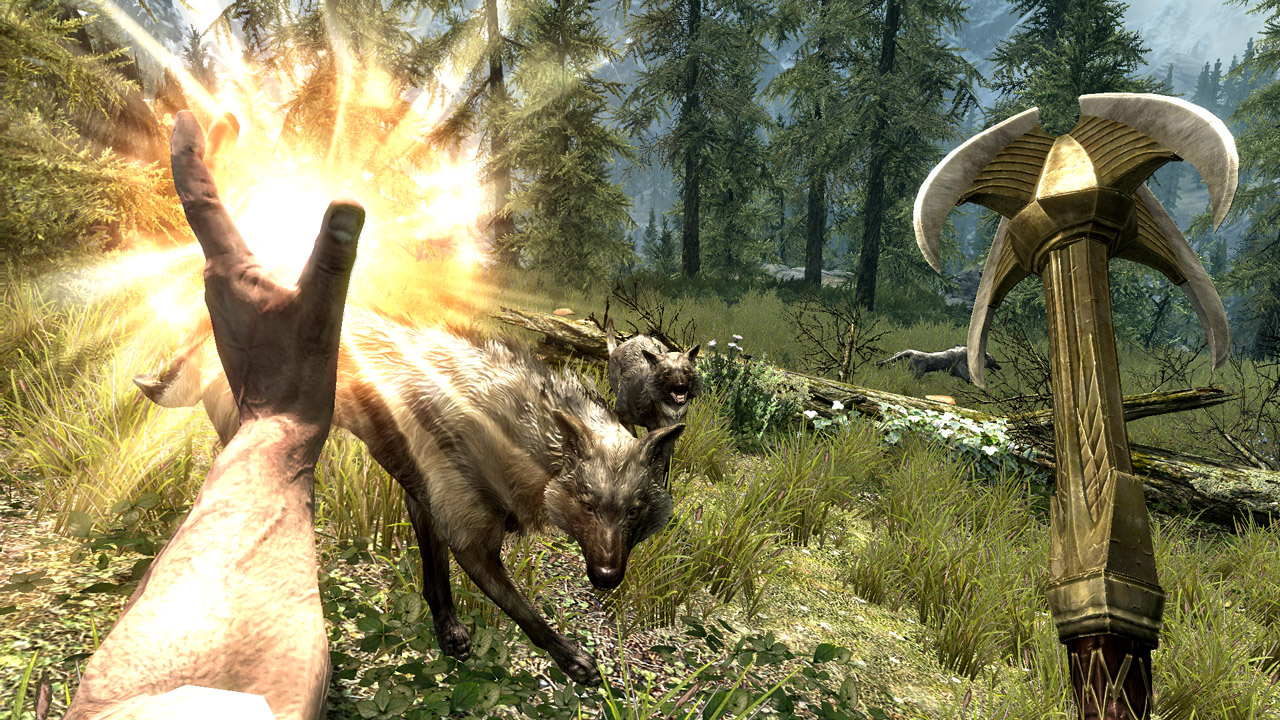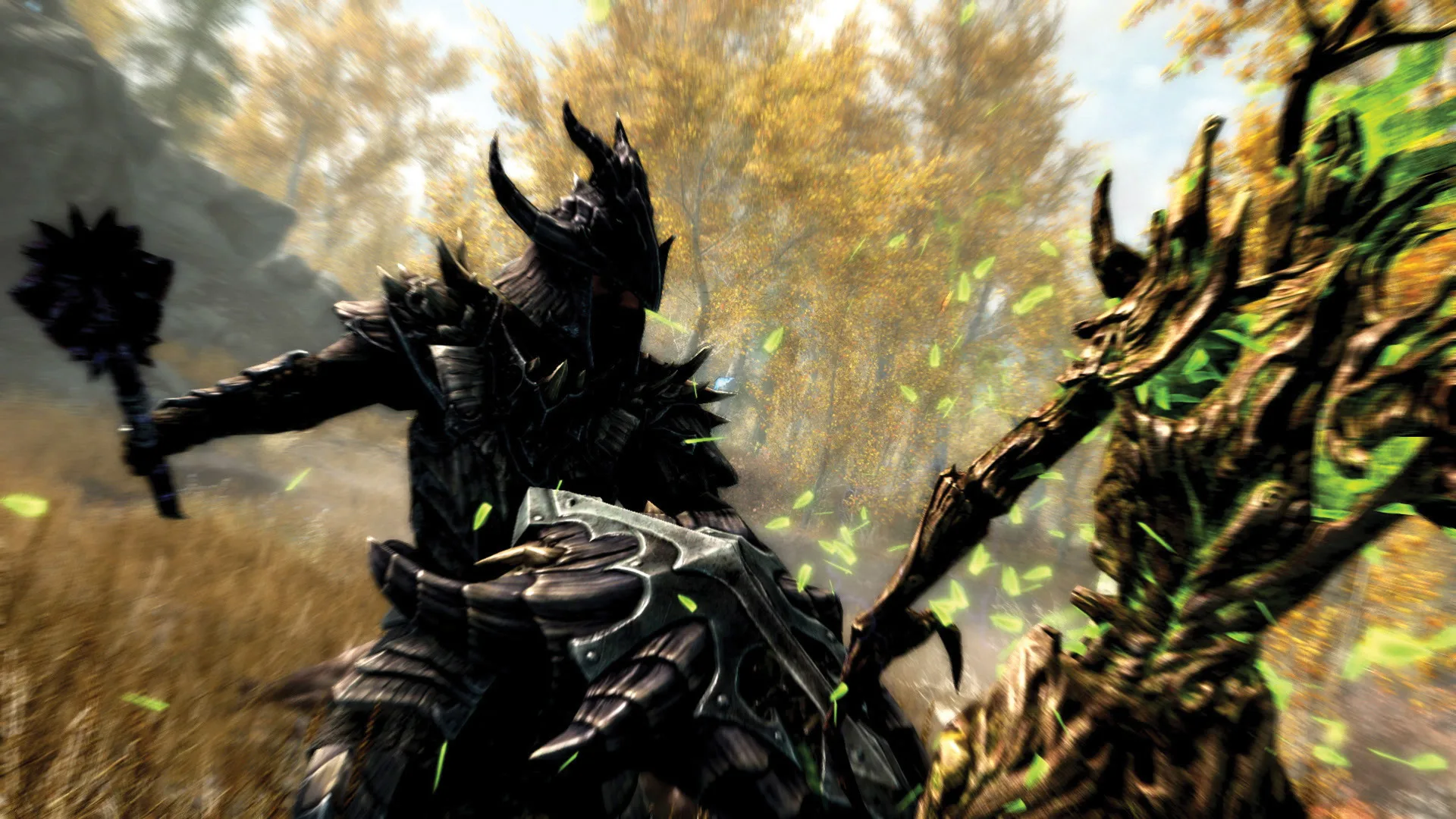
Like many college students in the wake of COVID I found myself rightfully removed from my New York college campus and sent back home with the parting gift (or curse) of an abundance of time and very few ways to spend it. Freshly devoid of face-to-face interactions with friends and swindled of the final days of my senior year, I turned to my tried-and-tested aegis from my steadily growing feelings of nihilism at the increasingly bleak state of society and the world at large: video games. But I could not just play any old video game. In the diminishing chances of a speedy end to the pandemic, I needed a game that I couldn’t necessarily lose myself in but dunk my head into like a panicked ostrich. Then it hit me. What else could it be other than the lord of time-wasting? The eternally-remastered? Todd Howard’s cash cow? I of course am referring to The Elder Scrolls V: Skyrim.
So, like a Loony-Tunes anvil, I dropped forty dollars on Skyrim Special Edition. I hastily an Imperial character, hastily dubbed him ‘Coronius Quarantino’ and set him up as a heavily armored, dual-wielding warrior. I hadn’t played Skyrim since I had been in high school, and amongst the increasingly grim news I got bombarded with every day the waves of nostalgia were surprisingly calming. Re-exploring the Skyrim’s mountains, cities, caves, and dungeons was like visiting a friend I hadn’t seen in years.
For those that haven’t played Skyrim, the appeal is not difficult to see. Skyrim focuses on the player character, known as the Dragonborn, who is the last hope for the game’s titular realm as the encroaching threat of dragons throws the world into chaos. While that story may sound like the fantasy save-the-world plot standard fare (and it is) Skyrim’s true appeal comes from the size of its open world, and the sheer number of ways it can be played. The player can become proficient in over 251 special abilities and use them all in a truly expansive world, with hundreds of dungeons to explore, monsters to slay, treasure to swindle, and secrets to uncover. However, my second adventure around the province lacked some of the luster compared to my first playthrough close to 10 years ago.
One of the first disconnects I noticed almost immediately was that the player character is the most special person to ever exist. While the main story quest hinges on the player’s status as the Dragonborn, a warrior that can harness the power of dragons, through side quests the player can accrue enough titles to make Daenerys Targaryen turn green with envy. Including the game’s bonus content, the player can become a spouse, parent, homeowner, the leader of a group of werewolf mercenaries, head of an (literally) underground crime syndicate, head of the largest conclave of mages in the province, prolific bard, captain of guild of assassins for hire, killer of an emperor, slayer of dragons and their patron demigod, killer of the first dragonborn, pseudo-mayor of nine separate cities, champion of fifteen separate arch-demons, the singular deciding factor in a civil war, professional vampire hunter (or vampire lord depending on your choices), have the ability to blot out the sun at will, as well as doing hundreds of odd jobs for whoever corners you on the street. While it is difficult to believe that any of this could happen to any one person over the course of their lifetime, even within the confines of a fantasy universe, the real disconnect comes from something much more encompassing. Despite wielding nearly godlike power by the later hours of the game, the ultimate payoff of the player’s collective achievements is…nothing. More specifically, as the player grows in power, the world does not change with them in meaningful ways. I noticed this for the first time in interactions with a character named Nazeem, who continually mocked me in passing for being lower class. Nazeem’s classist barbs may have made sense when I started the game with 10 gold coins, but grew increasingly tiresome and nonsensical when I had over 200,000 gold, a sword forged from a star, and was major a political figure in the city he lived in.
While playing Skyrim, I found myself compulsively comparing it to its more grimdark fantasy counterpart, The Witcher 3: Wild Hunt. Released just 4 years after Skyrim, in The Witcher 3, the player takes on the role of Geralt of Rivia, a mutant monster hunter for hire known as a witcher. In the game’s fantasy realm, known simply as “The Continent” witchers occupy a nebulous niche in society, simultaneously scorned for their mutations but essential for their monster-killing services. The game adaptation from a series of novels by Polish author Andrej Sapkowski is done spectacularly by developers CD Projekt Red. Characters have clear motivations, conflicts are tangible in every line of dialogue, and describing the supporting cast as simply likable is doing the stellar writing a disservice. However, the game’s beating heart is Geralt himself. Geralt’s status as a witcher gives the player a surprising amount of flexibility when it comes to how they want to play Geralt, as he can understandably act as either a grizzled misanthrope or sympathetic anti-hero. This is doubly remarkable as even with the multiple directions the player can take Geralt, his tangibility in the plot and his relationships to those around him never felt forced. Put simply, when I made a decision as Geralt that decision meant something, Unlike my Dragonborn in Skyrim, playing Geralt made me believe that I had not only a stake in the story, but a more tangible sway on its trajectory even if the ramifications of my actions wasn’t readily apparent.
However, what makes Geralt an interesting character to play is that his skills are limited, rather than having infinite potential. More specifically, The Witcher 3 breaks up its skills into four skill trees focusing on swordplay, magic runes, alchemy, and utility skills, most of which tweak Geralt’s combat skills (with the exception of a jedi-mind-trick-esque ability that can be used to unlock different dialogue options). What is interesting about these is that often, Geralt will be using all these skills in combat, and the skill trees are used more like avenues in what players want to specialize in. To that end, unlike Skyrim, there are skills that the player can completely ignore if they want to progress through the game. It is this limitation to Geralt’s abilities that makes him compelling because there are set things that he can and cannot do. Unlike Skyrim, where the player is usually the person who solves ninety percent of most characters problems, Geralt is often forced to rely on other characters to complete his own objectives. This creates a very interesting dynamic in game’s story, as Geralt’s limitations effectively establish the niche he occupies in the game’s universe.
In the end, I’m not saying that Skyrim was a bad game, or even that The Witcher 3 was better. I enjoyed delving into hundreds of Skyrim’s dungeons and slaying its menagerie of fell monsters, regardless of how many times I had done it, almost as much as I enjoyed the emotional tale of Geralt of Rivia. Although what juxtaposing these games made apparent to me is the complex philosophy of making a Role-Playing Game and to what degree of customization game designers afford their players. In a game where you can do anything and be anyone, it is nearly impossible to write a singular story for all contingencies of what a player could decide to do with their blank slate of a character. As a result, the players do not necessarily take on the role of a character, but a living breathing plot-impetus, with very few interactions with characters feeling organic or meaningful. On the other hand, game designers give the players a set character, one with preestablished relationships, personal history, and characters traits. However because of this, the player’s freedom to become whatever they want would be drastically reduced, as the player character, like all characters, would be defined by their limitations as much as their capabilities. In playing a set character, the players are empowered to develop more organic relationships with other NPCs and make impactful story decisions thanks to their character’s preestablished history.
Once again, both Skyrim and The Witcher 3: Wild Hunt are excellent games in their own right, but they both serve to be good illustrations on how game designers prioritize gameplay or story during the development process.
Comment Box is loading comments...

